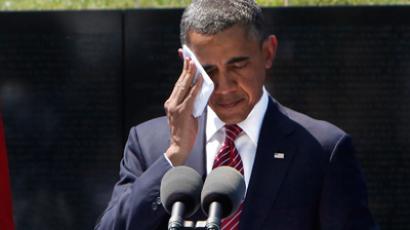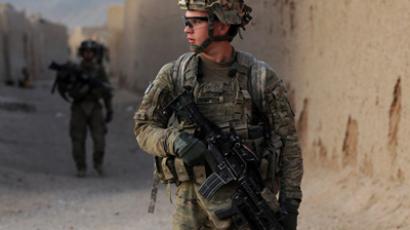World at risk as Syrian chemical stockpile faces plunder
The West supports the opposition and proposes regime change in Syria. But should President Assad be removed, what would happen to his vast arsenal of chemical weapons, which may become a powerful tool of terrorism for radical extremists?
Charles Blair from the Federation of American Scientists shared with RT his views on the ramification of the Syrian conflict on the regional and global security.RT: Syria controls one of the Arab World’s largest stockpiles of weapons of mass destruction, which could pose a global threat if it ends up in the wrong hands. If these chemical weapons fall into the hands of Islamist and Al-Qaeda groups fighting for the rebels, what could the consequences be?Charles Blair: I think that the key point that you made is what there might be. Certainly, we don’t have an understanding of how large the stockpile is. So it’s hard to precisely determine what the effect would be. But given the estimates of the stockpile as it is now, specifically the chemical weapons, you could see the weapons themselves used either within Syria, between different factions – if it’s a civil war – that are vying for power. You could see it used by the Assad regime against the Free Syrian Army. Or in other scenarios, if there was complete chaos you could see groups, like jihadist-type groups, violent Islamist groups taking those agents out of Syria.And then they’d have some work to do. They’d have to weaponize the agents, they’d have to do some sort of research and development with them, but then it’s likely they could employ those weapons really anywhere throughout Northern Africa, Europe. They could even potentially bring them here within the United States. And of course the Asian countries – South Asia, Russia and East Asia would also be at risk. So, it really is a general, global threat that we are looking at.RT: We heard concerns about chemical weapons in Libya, but that threat has never materialized. Why should we be worried this time?CB: Libya joined the Chemical Weapons Convention in 2003, as you may well know, after they abandoned their nuclear program. And the Libyans were very co-operative. They showed the OPCW – the Organization for the Prohibition of Chemical Weapons, the people that run the chemical weapons convention, the UN – they demonstrated all the chemical weapons they had and where they were.And frankly, the chemical weapons at the Libyans’ hands were in very poor quality. They only had what we call nerve agents, which are the crudest types – they are very dangerous, but they are crude in terms of their sophistication of building. And so they had all been declared, and they were in about half a dozen leaky canisters at one central location. So what happened was, it got politicized a little bit, people were saying, “Well, what if chemical weapons are used?” when the experts knew, actually, that was not a possibility.The difference is that with Syria, they have a much, much larger stockpile. Syria is not a part of the Chemical Weapons Convention, meaning that there are no UN inspectors, there’s no way of knowing what they have, and they have much, much larger quantities.RT: So what is the lesser evil here – Assad staying in power or these reserves falling into the hands of militants?CB: I think that is what the international community is grappling with. If your only wish as a state is to prevent the use of chemical weapons outside of that state or against civilians, then you have two strategies. The first would be to quickly try to support the Syrian Free Army to get it organized, so that when it does eventually take over control of Syria, they could quickly account for the chemical weapons. And that might be one of the reasons why the United States and some Western nations are pushing hard for a military action, if they can get the Chinese and the Russians on board.The other way that you can look at it is that if you are playing the long game, which some would say the Russians and the Chinese are doing, then maybe the safest is just to let the things play out hoping that the Assad regime stays in power. If that is the case, than the chemical weapons would most likely are going to be kept in safe hands. A lot of this is dependent on what you think the ultimate outcome is going to be. Can Assad cling to power? Can he do it in a way that would not involve mass defections of army units that may have access to chemical weapons? Or do you think it’s a completely lost cause?If the US and other Western forces with the support of Russia and China need to move in quickly and establish some sort of organizational method, so that when power is given to the Free Syrian Army, it’s a smooth transition. And one of the lessons of what happened in Libya is that although there was much support for the Libyan opposition, what was discovered later was that that opposition was still quite fragmented. So hopefully people have learned from that, and if we do support the anti-Assad forces, we could work more clearly with them to have a more cohesive organizational structure.















